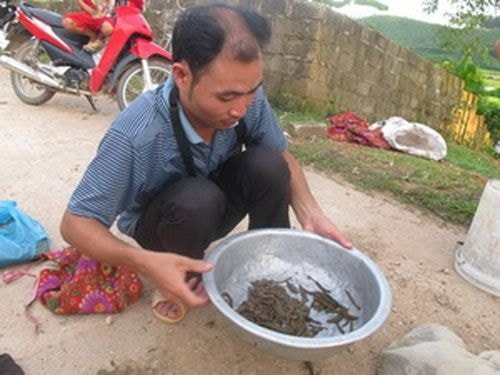When Chinese traders "set traps"
Currently, the price of dried sliced young oranges in the Mekong Delta is being inflated very high, the possibility that collectors will fall into the trap of Chinese traders is very high.
 |
| Chinese traders once created a "leech fever"... |
Almost every day on the mass media there is news of Chinese traders buying Vietnamese agricultural products in very unusual ways: from leeches to pepper, dragon fruit buds, soursop leaves, young areca nuts... And now it is dried sliced young oranges. No one knows what they buy those things for? Some guess this, others guess that: Like buying dragon fruit flowers to make medicine, buying young areca nuts to make medicine... to enhance sexual performance. Many greedy people have spent huge amounts of money to buy, collecting a huge amount of goods. But then the Chinese traders quickly disappeared, leaving the buyers with huge "bitter fruits".
Through many such transactions, recently, many economists have summarized the rules of the agricultural product purchasing journey of the above Chinese traders. Take pepper as an example. Phase 1: The above traders will spread rumors that they need to buy a large amount of pepper, with the initial price offered quite high, causing many greedy people to collect. Next, they buy a batch of goods of about a few hundred tons, at a price of 175-180 thousand VND/kg. Then they order a little more at 185 thousand/kg, deposit a small amount of money with the request "buy quickly, get it right away". From there, the rumor spread, many greedy people will spend a large amount of money to collect this type of goods, because the price of 185 thousand/kg ordered by Chinese traders is much higher than the market price.
Phase 2: The above traders will inflate the pepper purchase price to an… sky-high level, but do not buy it immediately. Because of greed, many people spend more money to collect pepper, pile it up and wait for Chinese traders. Phase 3: This is the phase where Chinese traders bring the pepper they bought in phase 1 to sell back to… the Vietnamese people who are buying pepper, at a price approximately equal to the price they inflated. As a result, they earn a large difference. They take that difference and… disappear. The result is that hundreds of people sit and look at the piles of pepper piled up in their houses without knowing how to solve the problem. Having already collected it at a high price, now selling it back to the market will result in a heavy loss, and they cannot sell it. The money to buy pepper is mostly borrowed from the bank. They pay interest every day. Pepper is still a hope to be sold, even at a loss, but other agricultural products such as dragon fruit buds, soursop leaves, or dried sliced young oranges... have to be thrown away because no one can sell them to them.
Currently, the price of dried sliced young oranges in the Mekong Delta is being inflated to very high levels, and the possibility that collectors will encounter such a situation is very high. The purpose of those Chinese traders is nothing other than to disrupt the Vietnamese agricultural market and profit from that disruption. In addition, the purpose of destroying Vietnamese agriculture is also quite clear: Dragon fruit buds are being plucked, oranges are being plucked unripe... which will cause hundreds of thousands of hectares of dragon fruit and oranges to fail. Surprisingly, when asked by the press, many competent authorities and functional agencies in those localities often "only heard" and promised "to check"....
According to NNVN
